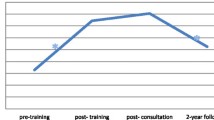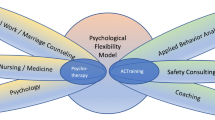Abstract
The training literature suggests that ongoing support following initial therapist training enhances training outcomes, yet little is known about what occurs during ongoing support and what accounts for its effectiveness. The present study examined consultation sessions provided to 99 clinicians following training in cognitive-behavioral therapy for youth anxiety. Recorded consultation sessions (N = 104) were coded for content and consultative methods. It was hypothesized that behavioral rehearsal (an active learning technique) would predict therapist adherence, skill, self-efficacy, and satisfaction at post-consultation. Regression analyses found no significant relation, however, clinician involvement during consultation sessions positively moderated the relationship between behavioral rehearsals and skill. Implications, limitations, and future directions are discussed.
Similar content being viewed by others
Notes
Ethnicity data were missing for 5.1 % of participants.
Unfortunately, we did not archive whether clinicians participated in consultations sessions via telephone or computer.
References
American Psychological Association. (2005, August). American psychological association policy statement on evidence-based practice in psychology. Retrieved from http://www.apa.org/practice/resources/evidence/evidence-based-statement.pdf.
Bandura, A. (1977). Social learning theory. Englewood Cliffs, NJ: Prentice Hall.
Beidas, R. S., Barmish, A. J., & Kendall, P. C. (2009). Training as usual: Can clinician behavior change following reading a manual and attending a brief workshop on cognitive behavioral therapy for youth anxiety? The Behavior Clinician, 32(5), 97–101.
Beidas, R. S., Cross, W. F., & Dorsey, S. (2013a). Show me, don’t tell me: Behavioral rehearsal as a training and analogue fidelity tool. Cognitive and Behavioral Practice.
Beidas, R. S., Edmunds, J. M., Cannuscio, C. C., Gallagher, M., Downey, M. M., & Kendall, P. C. (2013b). Therapists perspectives on the effective elements of consultation following training. Administration and Policy in Mental Health and Mental Health Services Research. doi:10.1007/s10488-013-0475-7.
Beidas, R. S., Edmunds, J. E., Marcus, S. C., & Kendall, P. C. (2012). Training and consultation to promote implementation of an empirically supported treatment: A randomized trial. Psychiatric Services, 63(7), 660–665. doi:10.1176/appi.ps.201100401.
Beidas, R. S., & Kendall, P. C. (2010). Training clinicians in evidence-based practice: A critical review of studies from a systems-contextual perspective. Clinical Psychology: Science and Practice, 17(1), 1–30. doi:10.1111/j.1468-s2850.2009.01187.x.
Bennett-Levy, J., McManus, F., Westling, B. E., & Fennell, M. (2009). Acquiring and refining CBT skills and competencies: Which training methods are perceived to be most effective? Behavioural And Cognitive Psychotherapy, 37(5), 571–583. doi:10.1017/S1352465809990270.
Brodman, D. M., Edmunds, J. M., Beidas, R. S., Read, K. L., Ringle, V.A., & Kendall, P. C. (2012). Consultation during dissemination of CBT for child anxiety: The relation between the use of case discussion and therapist training outcomes. Poster presented at the Association for Behavioral and Cognitive Therapies 46th Annual Convention, National Harbor, Maryland.
Caplan, G., & Caplan, R. B. (1993). Mental health consultation and collaboration. San Francisco, CA: Jossey-Bass.
Cross, W. F., Seaburn, D., Gibbs, D., Schmeelk-Cone, K., White, A. M., & Caine, E. D. (2011). Does practice make perfect? A randomized control trial of behavioral rehearsal on suicide prevention gatekeeper skills. Journal of Primary Prevention, 32(3–4), 195–211. doi:10.1007/s10935-011-0250-z.
Davis, D., O’Brien, M. A., Freemantle, N., Wolf, F. M., Mazmanian, P., & Taylor-Vaisey, A. (1999). Impact of formal continuing medical education: Do conferences, workshops, rounds, and other traditional continuing education activities change physician behavior or health care outcomes? Journal of the American Medical Association, 282(9), 867–874. doi:10.1001/jama.282.9.867.
Faul, F., Erdfelder, E., Buchner, A., & Lang, A.-G. (2009). Statistical power analyses using G*Power 3.1: Tests for correlation and regression analyses. Behavior Research Methods, 41, 1149–1160.
Fixsen, D. L., Naoom, S. F., Blase, K. A., Friedman, R. M., & Wallace, F. (2005). Implementation research: A synthesis of the literature. Tampa, FL: University of South Florida, Louis de la Parte Florida Mental Health Institute, The National Implementation Research Network. Retrieved from http://ctndisseminationlibrary.org/PDF/nirnmonograph.pdf.
Heinze, A., & Procter, C. (2006). Online communication and information technology education. Journal of Information Technology Education, 5, 235–249. Retrieved from www.jite.org/documents/Vol5/v5p235-249Heinze156.pdf.
Herschell, A. D., Kolko, D. J., Baumann, B. L., & Davis, A. C. (2010). The role of therapist training in the implementation of psychosocial treatments: A review and critique with recommendations. Clinical Psychology Review, 30(4), 448–466. doi:10.1016/j.cpr.2010.02.005.
Hocking, R. R. (2003). Methods and applications of linear models: Regression and the analysis of variance. New York, NY: Wiley.
James, W. B., & Gardner, D. L. (1995). Learning styles: Implications for distance learning. New Directions for Adult and Continuing Education, 67, 19–31. doi:10.1002/ace.36719956705.
Kendall, P. C., & Hedtke, K. (2006). Cognitive-behavioral therapy for anxious children: Therapist manual (3rd ed.). Ardmore, PA: Workbook Publishing.
Kolb, D. A. (1984). Experiential learning: Experience as the source of learning and development. Englewood Cliffs, NJ: Prentice Hall.
Lomas, J. (1993). Diffusion, dissemination, and implementation: Who should do what? Annals of the New York Academy of Science, 703, 226–235. doi:10.1111/j.1749-6632.1993.tb26351.x.
McHugh, R. K., & Barlow, D. H. (2010). The dissemination and implementation of evidence-based psychological treatments: A review of current efforts. The American Psychologist, 65(2), 73–84. doi:10.1037/a0018121.
Milne, D. (2007). An empirical definition of clinical supervision. The British Journal of Clinical Psychology, 46(4), 437–447. doi:10.1348/014466507X197415.
Milne, D., Aylott, H., Fitzpatrick, H., & Ellis, M. (2008). How does clinical supervision work? Using a “best evidence synthesis” approach to construct a basic model of supervision. The Clinical Supervisor, 27(2), 170–190. doi:10.1080/07325220802487915.
Milne, D. & James, I. (2000). A systematic review of effective cognitive-behavioural supervision. The British Journal of Clinical Psychology, 39(2), 111–127. Retrieved from http://www.ncbi.nlm.nih.gov/pubmed/10895356.
Ozer, E. M., Adams, S. H., Gardner, L. R., Mailloux, D. E., Wibbelsman, C. J., & Irwin, C. E. (2004). Provider self-efficacy and the screening of adolescents for risky health behaviors. Journal of Adolescent Health, 35(2), 101–107. doi:10.1016/j.jadohealth.2003.09.016.
Perepletchikova, F., & Kazdin, A. (2005). Treatment integrity and therapeutic change: Issues and research recommendations. Clinical Psychology: Science and Practice, 12(4), 365–383. doi:10.1093/clipsy.bpi045.
Pimentel, S. S., Regan, J., Comer, J. S., Hoagwood, K. E., & Albano, A. M. (2013). Disseminating evidence-based treatments for children: A microanalysis of consultation calls as an ongoing training strategy. Manuscript under review.
President’s New Freedom Commission on Mental Health. (2003). Report of the President’s New Freedom Commission on Mental Health. Retrieved from http://govinfo.library.unt.edu/mentalhealthcommission/reports/reports.htm.
Rakovshik, S. G., & McManus, F. (2010). Establishing evidence-based training in cognitive behavioral therapy: A review of current empirical findings and theoretical guidance. Clinical Psychology Review, 30(5), 496–516. doi:10.1016/j.cpr.2010.03.004.
Read, K. L., Edmunds, J. M., Beidas, R. S., Brodman, D. M., Ringle, V., & Kendall, P. C. (2012). The influence of exposure-specific content during consultation calls on community clinicians’ skill in preparing anxious youth for exposure tasks. Poster presented at the Association for Behavioral and Cognitive Therapies 46th Annual Convention, National Harbor, Maryland.
Stirman, S., Buchhofer, R., McLaulin, B., Evans, A., & Beck, A. (2009). Public-academic partnerships: The Beck initiative: A partnership to implement cognitive therapy in a community behavioral health system. Psychiatric Services, 60(10), 1302–1304. doi:10.1176/appi.ps.60.10.1302.
Stirman, S. W., Kimberly, J., Cook, N., Calloway, A., Castro, F., & Charns, M. (2012). The sustainability of new programs and innovations: A review of the empirical literature and recommendations for future research. Implementation Science, 7, 17. doi:10.1186/1748-5908-7-17.
Weisz, J. (2004). Therapist Background Questionnaire. Boston, MA: Harvard University, Unpublished measure.
Weisz, J. R., Ugueto, A. M., Herren, J., Afienko, S. R., & Rutt, C. (2011). Kernels vs. ears, and other questions for a science of treatment dissemination. Clinical Psychology: Science and Practice, 18(1), 41–46. doi:10.1111/j.1468-2850.2010.01233.x.
Acknowledgments
Funding for this research project was supported by NIMH grants to Beidas (MH083333; MH099179) and Kendall (MH083333; MH063747). Additionally, the preparation of this article was supported in part by the Implementation Research Institute (IRI), at the George Warren Brown School of Social Work, Washington University in St. Louis; through an award from the National Institute of Mental Health (R25 MH080916) and Quality Enhancement Research Initiative (QUERI), Department of Veterans Affairs Contract, Veterans Health Administration, Office of Research & Development, Health Services Research & Development Service. Dr. Beidas is an IRI fellow.
Author information
Authors and Affiliations
Corresponding author
Rights and permissions
About this article
Cite this article
Edmunds, J.M., Kendall, P.C., Ringle, V.A. et al. An Examination of Behavioral Rehearsal During Consultation as a Predictor of Training Outcomes. Adm Policy Ment Health 40, 456–466 (2013). https://doi.org/10.1007/s10488-013-0490-8
Published:
Issue Date:
DOI: https://doi.org/10.1007/s10488-013-0490-8




